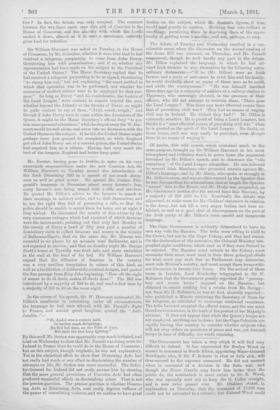Sir William Harcourt was asked on Tuesday, in the House
of Commons, by Mr. Schreiber, whether it were true that he bad received. a telegram, purporting to come from John Devoy, threatening him with assassination ; and if so, whether any representation had been made on the subject to the President of the United States P The Home Secretary replied that he had received a telegram purporting to be so signed, threatening " to stamp him out," but not explaining "the exact method in which that operation was to be performed, nor whether the
resources of modern science were to be employed for that pur- pose." So long. as Devoy " and his confederates, the leaders of the Laud. League," were content to remain beyond the seas, whether beyond the Atlantic or the Straits of Dover, we 'might be quite content to say of them, "Abut, evasit, erupit;" and though if John Devoy were to come within the dominions of the
Queen, it might be the Home Secretary's official duty "to pay him some personal attentions," while lie stayed away Sir W. Har- court would, let well alone, and enter into no discussion with the United States on the subject. 11.1 he did, the United States might perhaps have just ground for complaint, as while England got rid of John Devoy out of a convict prisou, the United States had acquired him as a citizen. Having had very much the best of the bargain, England had better keep quiet.


































 Previous page
Previous page